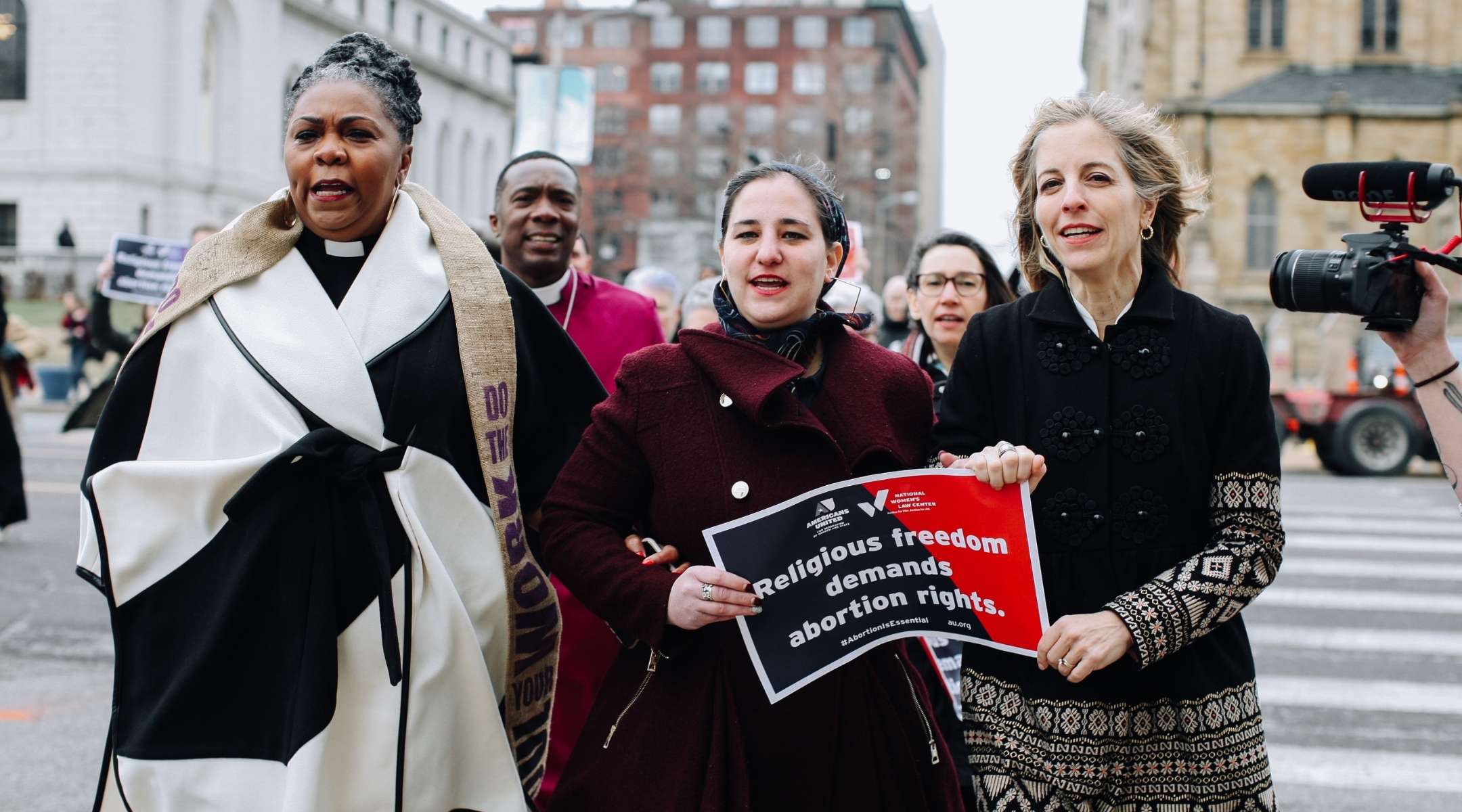5 rabbis sue state of Missouri over abortion bans on religious freedom grounds
The lawsuit argues that Missouri’s abortion law violates the separation of church and state

From left to right: Rev. Traci Blackmon, Maharat Rori Picker Neiss and Americans United for Separation of Church & State CEO Rachel Laser march to the Civil Courts building in St. Louis. (Courtesy of Americans United for Separation of Church & State)
(JTA) — Five rabbis from multiple Jewish denominations are among more than a dozen Missouri faith leaders challenging the state’s ban on abortion.
In a lawsuit filed Thursday in St. Louis Circuit Court, the faith leaders charge that lawmakers acted according to their personal religious beliefs and violated the separation of church and state protected in Missouri’s constitution.
“I was really proud to have the opportunity to join in this lawsuit because I’ve seen the ways in which religious views are being enshrined into laws in Missouri and across the country,” Maharat Rori Picker Neiss, the executive director of the Jewish Community Relations Council of St. Louis and a prominent activist in the St. Louis area, told the Jewish Telegraphic Agency.
“That’s fundamentally dangerous, I think, for our democracy, for all citizens, but especially for our Jewish community,” she added.
Jewish activists have been particularly active in contesting abortion restrictions imposed since the Supreme Court’s rollback of Roe v. Wade last year.
In Florida, a synagogue sued the state over its abortion law in June, arguing that the 15-week ban on abortion “prohibits Jewish women from practicing their faith free of government intrusion and this violates their privacy rights and religious freedom.” In September, three Jewish women were part of a lawsuit filed in Indiana claiming that the state’s ban on abortion violates the state’s Religious Freedom Restoration Act.
And in October, three Jewish women filed a lawsuit to block Kentucky’s abortion restrictions on religious freedom grounds, arguing that the law violates their ability to practice Jewish understandings of when life begins and impedes the possibility of in-vitro fertilization, which is also permissible by Jewish law.
In Missouri, the faith leaders partnered with the National Women’s Law Center and Americans United for Separation of Church and State in drafting their lawsuit. They are seeking to overturn a blanket ban on abortions except in the case of a medical emergency. The law, which was written in 2019 but went into effect after the Supreme Court ruling because of a “trigger” provision, makes performing abortions a felony punishable by five to 15 years in prison and says providers can lose their medical licenses.
“What the lawsuit says is that when you legislate your religious beliefs into law, you impose your beliefs on everyone else and force all of us to live by your own narrow beliefs,” said Michelle Banker, the director of reproductive rights and health at the National Women’s Law Center and the lead attorney in the case. “And that hurts us. That denies our basic human rights.”
The lawsuit cites multiple specific instances of religious language used by the bill’s sponsors and supporters. The bill’s lead sponsor, for example, is quoted in the lawsuit as having said, “As a Catholic I do believe life begins at conception and that is built into our legislative findings.”
Jewish tradition does not include the same belief, which is one reason that Jewish activists have been heavily involved in resisting abortion restrictions. Picker Neiss, who trained in an Orthodox setting, is joined by three Reform rabbis and one nondenominational rabbi who work in Missouri synagogues: James Bennett, Susan Talve, Andrea Goldstein and Douglas Alpert. Together, they make up 40% of the religious leaders to sign onto the lawsuit.
After filing their suit Thursday morning in St. Louis, the Missouri plaintiffs held a press conference and then marched to the Civil Courts building.
“It was really empowering to stand alongside so many people of such a diverse range of faith traditions, who all wanted to come together to say that religion doesn’t have any one answer to questions about abortion,” Picker Neiss said. “There is no one religious view in America. And so I just felt so heartened and inspired to stand arm in arm with religious leaders from across the spectrum.”
This article originally appeared on JTA.org.
A message from our Publisher & CEO Rachel Fishman Feddersen

I hope you appreciated this article. Before you go, I’d like to ask you to please support the Forward’s award-winning, nonprofit journalism so that we can be prepared for whatever news 2025 brings.
At a time when other newsrooms are closing or cutting back, the Forward has removed its paywall and invested additional resources to report on the ground from Israel and around the U.S. on the impact of the war, rising antisemitism and polarized discourse.
Readers like you make it all possible. Support our work by becoming a Forward Member and connect with our journalism and your community.
— Rachel Fishman Feddersen, Publisher and CEO

























